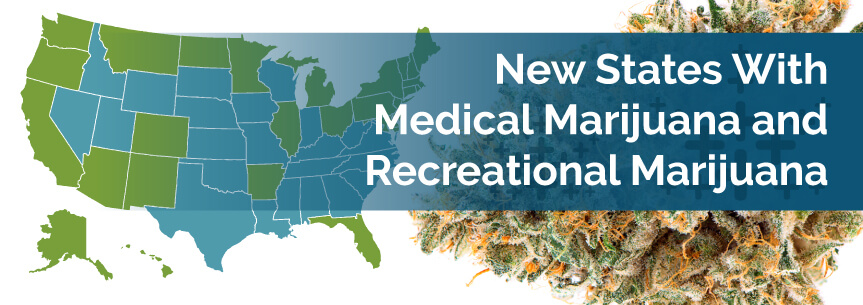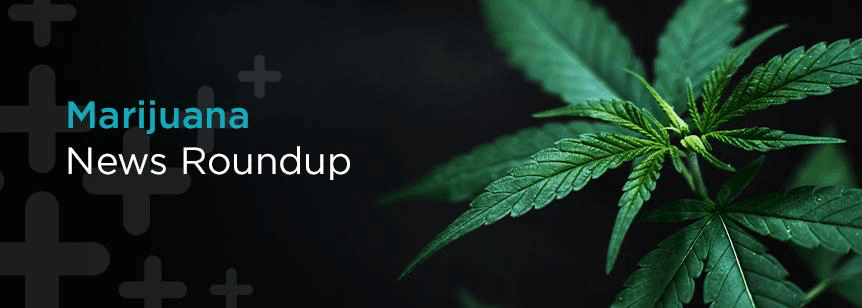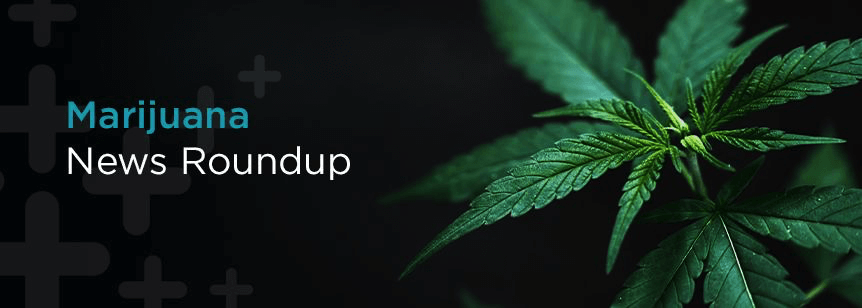When Americans awoke on the morning of Wednesday, November 9th, 2016, the vast majority focused on a new reality facing the nation. The king of reality television, Donald J. Trump was President-elect. While the mainstream media and many prominent political pundits bantered back and forth about the merits of a Hillary Clinton presidency versus a Donald Trump administration, there was another reality that a minority of voters focused on. Quietly, they spoke about it on election night. Their minority issue passed with a resounding majority — approving the reality that marijuana, for both medicinal and recreational purposes, was legalized in 8 more states.
This brings a total of 29 states — over one-half of the nation’s political boundary makeup — that approve of some form of marijuana legalization. The states allow weed to be consumed for health and relaxation purposes. They represent one-fifth of the American population and display the new reality that as each year passes, new medical and recreational marijuana states are joining the confederation of pot-users who are vehemently opposed to what they consider an archaic and draconian approach to regulating it.
It remains to be seen how the newest federal executive administration will respond to the reality that a huge majority of United States voters approve of cannabis and cannabis products being legalized as mainstream consumer products. Donald Trump was hazy during his campaign regarding his view on recreational marijuana but he was not blowing smoke on his take about medicinal cannabis.
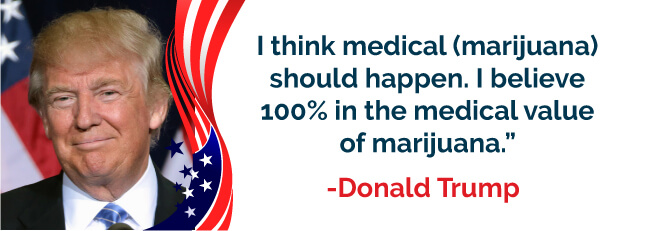
“I think medical (marijuana) should happen. I believe 100% in the medical value of marijuana,” Trump is on record as saying, but he’s a bit more evasive when it comes to recreational pot. The President-elect stayed clear of the recreational inhaling issue during his monumental campaign, but he did indicate he wouldn’t interfere with each state’s right to enact and enforce their own cannabis-related laws and policy agendas.
Returning to reality, it really isn’t up to Trump’s administration to meddle in affairs regarding what states legalized marijuana. The United States Federal Government still oversees the classification of marijuana as a Schedule 1 substance under the 1970 Controlled Substances Act. This is administered by the Food and Drug Administration (FDA) and enforced by the Drug Enforcement Agency (DEA). These federal laws, rules and regulations remain in place and are likely to do so for the next few years while Trump’s pick for Attorney General pursues higher priorities on their agenda.
As this evolving shift toward acceptance grows greener with each round of state and federal elections, what occurred this November was obvious as grass, whether on the lawn or in a pipe. Four recreational marijuana states spoke with a majority and four new medical marijuana states added themselves to the list of toke-tolerant regions.
Here’s a look at how the polls played in Florida, Arkansas, North Dakota and Montana where they passed legislation to allow the medicinal use of cannabis. California, Massachusetts, Maine and Nevada clearly voted yes to join the list of states that legalized recreational weed. Where recreational marijuana was on state tickets across the nation, only Arizona turned down the movement, and it did so only by a slight margin.
States Voting to Legalize Medicinal Marijuana
The reality of marijuana acceptance as a legitimate form of medicinal treatment took a leap forward with four more states joining the green medicine movement. Medicinal cannabis use is far more acceptable for legislators than recreational consumption. Most legislators see legalizing marijuana as a series of small steps starting with bringing medicinal marijuana out of the shadows. The marijuana movement across America had been a slow start for state politicians, but it’s becoming a fast finish in the minds of voters.
Until the recent vote, 25 American States already had approved the medicinal use of cannabis under supervised and controlled conditions. Included in the medicinal cannabis club were Alaska, Arizona, California, Colorado, Connecticut, Delaware, Hawaii, Illinois, Louisiana, Maine, Maryland, Massachusetts, Michigan, Minnesota, Montana, Nebraska, New Hampshire, New Jersey, New York, Oregon, Pennsylvania, Rhode Island, Vermont, Washington and West Virginia. Additionally, with the District of Columbia, the total number of jurisdictions permitting doctor-prescribed pot was 26.
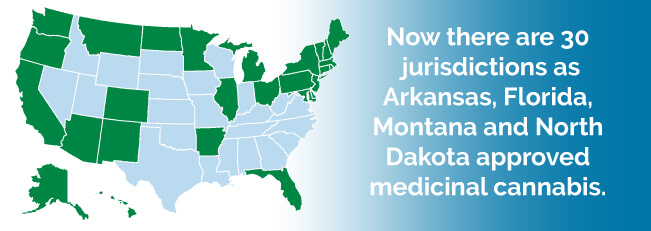
Now there are 30 jurisdictions as Arkansas, Florida, Montana and North Dakota came aboard the medicinal cannabis bus with their majority votes as states that allow weed to be used for treating a wide variety of medical ailments. Each state had slightly different voter reactions, and there were some various strings attached to the legalization.
Here are results of what happened on election night in the four states that voted to legalize the medicinal use of marijuana.
Arkansas
The State of Arkansas passed Issue 6 or the measure to legalize medical marijuana with 52.6 percent of voter approval. This was Arkansas’s first venture into the legalization of medicinal cannabis, whereas many other states had made repeated tabling of the medical pot issue prior to gaining approval.
Arkansas attached restrictions to its bill where medicinal marijuana consumers must have a doctor’s prescription and the product must be dispensed through a doctor-approved nonprofit “compassion center.” Allowable maximum possession is 2.5 ounces, and the patient must be in possession of the prescription at all times when holding or consuming cannabis.
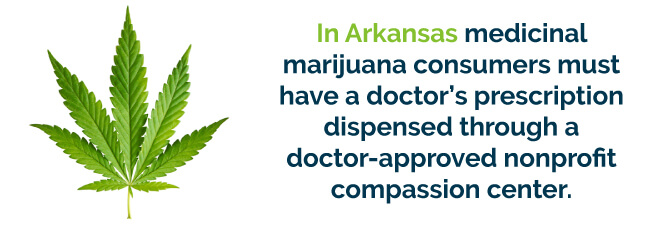
Persons living more than 20 miles from a recognized compassion center are legally allowed to grow marijuana provided they have no more than 6 plants and do not sell, give or otherwise distribute cannabis to others.
Arkansas also puts the responsibility on local and municipal governments to license cannabis dispensaries and undertake inspections to ensure compliance.
Florida
This was the second attempt for the State of Florida to bring legalization of medicinal marijuana to the people. The people spoke by giving 71.0 percent support to Amendment 2 that allows a licensed physician recognized and practicing in Florida to prescribe medicinal cannabis for patients who suffer from a debilitating disease where, in the doctor’s professional opinion, the patient may gain beneficial treatment from consuming cannabis.
Florida directs that all medical marijuana be dispensed by medical centers that produce and supply cannabis under the direction of the Florida Department of Health. Allowable possession is also set at 2.5 ounces of dried cannabis per patient. The medicinal marijuana must be kept in the prescribed user’s residence.
Montana
Montana actually voted to expand on an existing medicinal marijuana legislation from 2004 that was terribly restrictive. Montana’s previous laws made practically dispensing medical cannabis impossible to comply with. The old laws only allowed a licensed marijuana grower to supply up to three patients in total. This created a demand-to-supply-ratio that was completely unrealistic and was fueling the black market.
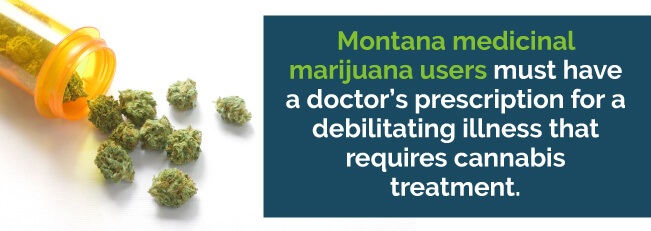
The Montana margin of in-favor voters for I-182 was nearly two-thirds, and it will free up a backlog of patient access. As with other states, Montana medicinal marijuana users must have a doctor’s prescription and are allowed a maximum amount of cannabis in their possession at any one time. The qualifier for medical marijuana in Montana is that the patient must have a debilitating illness that requires treatment by consuming cannabis.
North Dakota
Measure 5 was passed in North Dakota with a margin of 63.6 percent in favor of legalizing medical marijuana. This was one of the highest voter turnouts given North Dakota’s low population. This proved the state was overwhelmingly ready to accept cannabis as a legitimate pharmaceutical product.
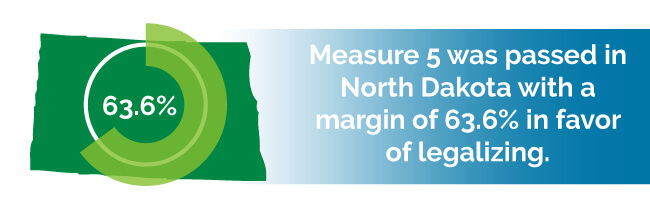
Part of North Dakota’s legislation identifies specific illnesses that can have medicinal marijuana prescribed as treatment. This includes all forms of cancer, HIV/AIDS, epilepsy, post-traumatic stress disorder (PTSD) and other psychological and physical illnesses. North Dakota medicinal marijuana patients are allowed to possess up to 3 ounces of dried cannabis.
Being a rural state, North Dakota’s medical marijuana legislation dictates that patients who hold prescriptions for cannabis possession are allowed to legally grow their own plants, provided they reside over 40 miles from a compassion center. The legislation also includes an identification system where patients must carry a state-issued identification card. Also, only licensed dispensaries can sell cannabis products.
States Voting to Legalize Recreational Marijuana
Legalizing the recreational use of marijuana is an entirely different subject than allowing certifiably ill patients to possess and consume medicinal cannabis. Most lawmakers tread lightly before drafting legislation and putting a recreational proposal out to their voting public. The time that elapsed before Arizona, California, Maine, Massachusetts and Nevada were ready is no exception to the path blazed by other states already allowing legal possession of cannabis.
Alaska, Colorado, Oregon and Washington, as well as the District of Columbia, led this year’s movement to fully legalize recreational use of marijuana. Each state provided its own specific rules regarding who could possess cannabis and how much marijuana they could have at one time, and it also set tight conditions as to where they could consume cannabis products in a recreational environment.
The examples set by these five pioneers in the recreational cannabis legislation market helped place parameters that the five new recreational marijuana states put forth to their voters in November’s election. With the exception of Arizona, all passed the recreational marijuana laws by a definite majority, making a total of 8 American states having legalized pot use and possession for no other reason than to simply get high and relax.
Here is how the votes for legalizing recreational marijuana turned out in Arizona, California, Maine, Massachusetts and Nevada, as well as the restrictive covenants set in each state.
California
At 38 million residents, California holds America’s largest population and accounts for one of the world’s largest economies. Possession of pot for medicinal purposes has been legal in California since 1996 with the passage of the Compassionate Use Act. California made an unsuccessful attempt at legalizing recreational use several years ago but failed by a tiny margin.
This time, Proposition 64 was approved by a 56 percent yes to a 44 percent no margin by voters who turned out in November’s election. This is a ringing endorsement of a complex act that California proposed. The basic framework for legalized recreational marijuana is that anyone in possession must:
- Be over 21 years of age
- Not have more than 8 grams of dried marijuana in their possession
- Not cultivate more than 6 plants
- Not consume any cannabis product in a public place, including in their vehicle or on their front porch where it can be visible to minors
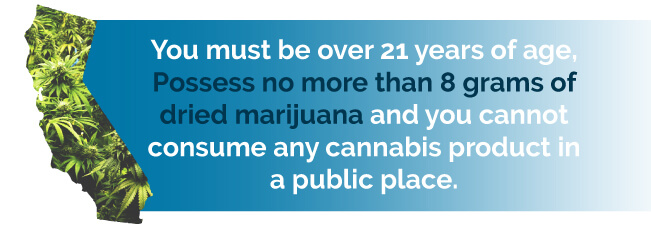
California has introduced a licensing and taxation system for recreational marijuana that’s similar to their laws governing the sale, possession and consumption of alcohol and tobacco. It places clear responsibilities on the vendors of cannabis products and also on cities or municipalities where recreational marijuana is sold and consumed.
An interesting addition to the California recreational pot laws is rescinding sentences and criminal records for persons convicted under the previous personal possession of marijuana legislation.
Taxation on recreational marijuana in California focuses on two separate areas. Facilities that cultivate marijuana for the recreational market are taxed higher than those that are smaller players at the retail sales end. Money from recreational marijuana taxes will be distributed to youth substance abuse education and law enforcement training with a prevention emphasis on driving under the influence (DUI) of cannabis.
California is also putting taxation from recreational marijuana to work in environmental programs including the cleanup of land damaged by illegal marijuana cultivation and exploring technology to advance hemp growing for other markets.
Maine
Saying yes to legalizing recreational pot in Maine was nearly snuffed out. Maine passed its Question 1 recreational cannabis laws by the smallest margin of any state with a majority vote of 50.2 percent that equated to only 2,600 votes of separation.
Regardless of the opposition, in Democratic Maine the majority still rules and legalizing recreational marijuana became a reality. Maine’s legislation passed with a few rules and regulations attached. This includes:
- The age of majority set at 21. No minors are allowed to possess cannabis for recreational purposes. Medicinal users having legitimate prescriptions from a doctor are exempt.
- Personal possession limits are set at 2.5 ounces of dried cannabis.
- Consumption of cannabis in public is prohibited.
- Personal cultivation allows up to 6 plants.
- Marijuana cultivated for personal recreational use may be shared as a gift but is not allowed to be sold for monetary compensation.
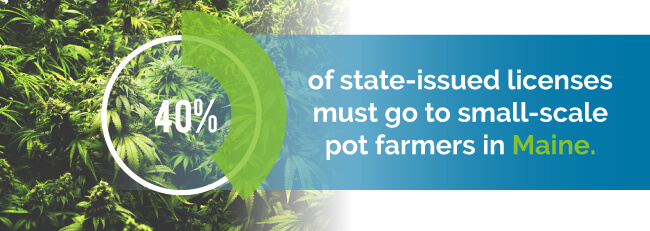
Maine takes a unique approach to licensing commercial marijuana growers. By the new state law, 40 percent of state-issued licenses must go to small-scale pot farmers. How Maine implements this will be interesting to watch.
Massachusetts
Question 4, the proposal to legalize recreational marijuana in Massachusetts, passed by 54 percent of the popular vote. Always a liberal Democratic state, blue Massachusetts was already a leader in the medicinal, compassionate cannabis movement and had medicinal pot legalized since 2012. Criminal penalties in Massachusetts for possessing personal marijuana were replaced long ago by civil fines and punishments.
The Commonwealth of Massachusetts designed its recreational marijuana laws similar to those existing on the possession and sale of alcohol and tobacco. The basic requirements to legally possess pot for pleasure in Massachusetts are:
- 21 years of age in order to consume, grow, sell or otherwise possess cannabis
- Maximum possession of 1 ounce in public
- Maximum possession of 10 ounces in a personal residence
- Maximum cultivation of 6 plants for personal recreational use
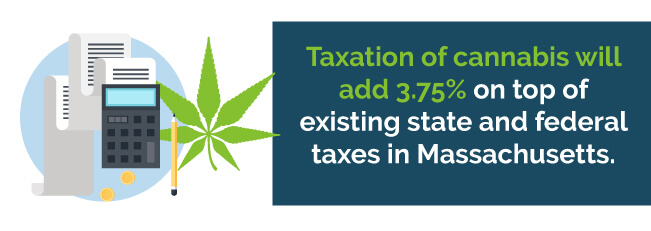
Massachusetts is creating a state Cannabis Control Commission that will oversee the transition and implementation of the recreation pot industry. Taxation of cannabis will add 3.75 percent on top of existing state and federal taxes that would normally apply to any consumer product. Local governments like towns and cities in Massachusetts are allowed to add an extra 2 percent tax on marijuana for their own revenue.
Nevada
Despite named the Sin State, much of Nevada is historically quite conservative. That’s slowly slipped with a move aligning Nevada with California, so it was no surprise when Nevada voters gave a 55.0 percent approval to Question 2, the state’s new recreational marijuana proposal. The bill specifically sets out the laws legalizing the possession, cultivation and sale of pot used for entertainment.
Parameters to be legal in possessing recreational weed in Nevada are:
- An adult of 21 or older, which is the same age of majority for drinking and gambling in Nevada
- Allowable personal possession of 1 ounce of dried marijuana or one-eighth of an ounce of cannabis concentrate
- Plant cultivation only for residents who are 25 miles from a state-licensed marijuana retail dispensary
- Maximum of 6 cannabis plants grown inside a locked and enclosed area
Nevada has imposed the heaviest taxes on the recreational marijuana industry. A 15 percent excise tax is levied on all products including licensing fees and permits. Revenue funds from the pot levy will be used to fund the administration, regulation and enforcement of the recreational marijuana laws.
Arizona
This was Arizona’s first attempt at putting the recreational cannabis question to its people. Proposition 205 failed by just 2.0 percent. This indicates the long Republican state was prepared to legalize recreational cannabis and come to age with its medicinal marijuana legalization laws passed in 1996.
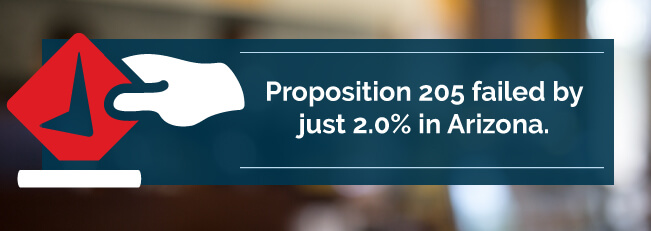
The no vote surprised pollsters who found every indication the red state was ready to loosen up and pass around the pot. But, like in the presidential race, pollsters got it wrong about Prop 205.
The proposed legislation to legalize recreational marijuana in Arizona had these conditions in mind:
- Possession age of 21 or older
- Maximum 1 ounce of dried cannabis in possession
- Cultivation not to exceed 6 plants
Taxation in Arizona was also proposed at 15 percent with the money going to a Marijuana Fund administered by the Department of Marijuana Licenses and Control. Partial distribution of the tax revenue was set for public schools and health departments.
Without a doubt, the issue of legalizing recreational marijuana in Arizona still smolders. Expect it to light up again in four years.
Federal Regulations
Over half the American states have legalized marijuana, either for medical use, recreational use or both. The geography pattern of states with liberal ideas toward legitimizing cannabis shows a clear wall along the west coast with pockets of pot-tolerating jurisdictions scattered in the north and along the eastern seaboard.
It’ll take time for the more conservative states in the mid-west and the south’s bible belt to come of age and realize the issue of marijuana will not be extinguished. There are 30 states that allow legalized weed in one localized form or another, but all of these states have limited say when it comes to total legalization of marijuana on a national scale.
The United States Federal Government is ultimately responsible for taking marijuana off Schedule 1 of the Controlled Substances Act where it’s listed as a drug with no accepted medical use and a high potential for abuse. These federal laws place marijuana in the same classification as cocaine, heroin, ecstasy and LSD.
The only way marijuana can be denounced as a dangerous drug and placed on the tolerable Schedule 2 list is for the Food and Drug Administration to accept that marijuana has verifiable medical benefits and that it’s no more harmful than alcohol or tobacco. Until then, the Drug Enforcement Agency must continue its policy on marijuana being illegal to transport across state lines and treat it as a criminal offense.
In the marijuana world, reality shows the Trump Administration will give a low rating to legalizing marijuana at the federal level.
Becoming a New Medical Marijuana Patient
For more information on registering as a medicinal marijuana patient or the laws regarding possession of marijuana for medicinal or recreational use, review our laws by state our consult one of our medicinal marijuana doctors online today!

